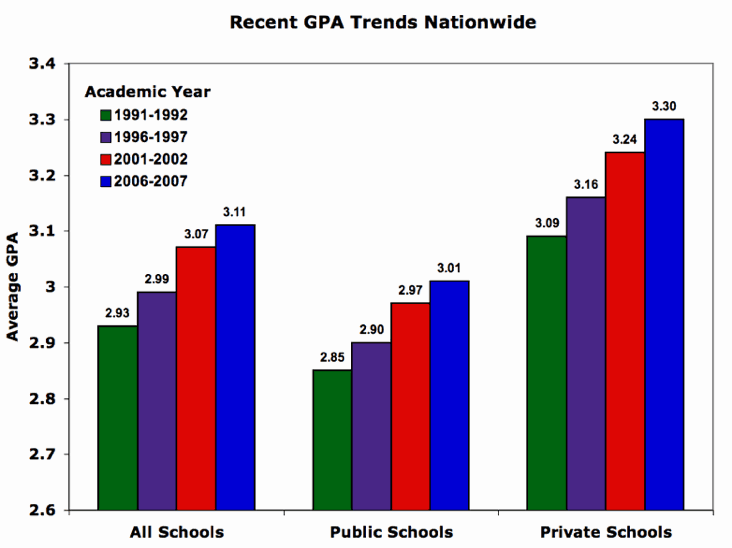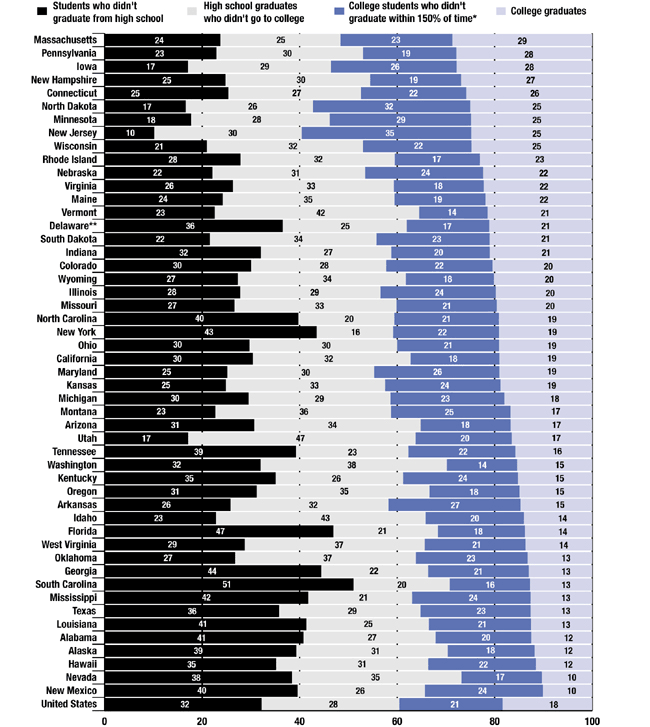How important is GPA?
GPA is one of the most important factors in college. It represents the student's
overall academic achievement. There is no doubt that keeping a good GPA in
college is no easy task.
According to a recent article in Dennews.com, for the
fall 2002 semester, freshmen studied (or didn't) their way to a cumulative grade
point average of 2.36 with sophomores earning a 2.83, a .47 point gap.
Northern
Illinois University freshmen received a 2.2 grade point average with sophomores
at 2.6, Western Illinois University (2.65-2.83), Illinois State University
(2.66-2.82) and Southern Illinois University (2.54-2.82) all reported
significant gaps.
Gradeinflation.com has been keeping track of the average
undergraduate GPA. The following chart shows trends in average undergraduate GPA
for several schools. |

Figure 1: GPA Trends for different school types |
The average undergraduate GPA is 3.1 and it is worse for freshmen. It is clear
that students need to work harder; but the question is ‘Do they know how to?’
One of the questions most frequently asked is, “What is a good GPA to have in
college?” The same question is often seen on the web. Everyone has a different
answer. Here is one from the internet, “A 3.0 GPA and above is considered good.
That is a B average.” Now what is wrong with this answer? First of all, this
person feels that average is acceptable. Consider this: many companies require a
3.5 to receive an interview and most professional schools recommend a 3.7 or
higher to be considered. The correct answer should be – Aim for a 4.0 and you
will have a good GPA.
We have heard over and over again, “I am making straight
A’s now but my GPA is low because of my freshmen year.” It is true that most
freshmen do not realize the importance of their GPA untill they are a junior or
senior. Freshmen year is one of the most important years. It takes years to
build a high GPA but only one semester to ruin it.
|
Retention Rates in College:
Staying in college is becoming tougher every year.
High tuition rates, problems at home, low GPA, are just some of the tribulations
that cause students to drop out. Take a look at the national college retention
rates according to www.highereducation.org: |

Figure 2: Loss Rate per 100 Ninth Graders at Each Transition Point (2002) |
| Nationally, only 18% of students graduate from college. This is a serious
problem. |
Test Taking: Why are students not ready?
Maintaining a good GPA and staying in
college are determined by two things:
1. How well do you organize your studies?
2. How well do you take tests?
In an article published by Education Week
(www.edweek.org), fewer than one-quarter of last school year’s graduating high
school seniors who took the ACT scored at the “college-ready” level in all four
subject areas, a finding that prompted the nation’s highest education official
to renew his demand that schools do a far better job preparing students for
college.
Take a look at the results published by the ACT Testing department. |

Figure 3: ACT Score Performance |
The proportion of tested graduating seniors who are “college ready” as defined
by the ACT grew from 22 percent in the class of 2008 to 23 percent in the class
of 2009. College-readiness levels remained within two-tenths of a percentage
point of where they’ve been since 2005.
“We need to increase the number of high
school graduates who are prepared to succeed in college,”U.S. Secretary of
Education Arne Duncan said in a statement released through ACT Inc. But how can
this be achieved?
The truth about our national educational system is that we do
not emphasize enough on education and more importance is given to other
activities such as sports, music, etc. Even though these activities are
important, education should be a top priority.
The key to a successful
educational career is ‘Knowing How to Learn.’
FreshmenSuccess realizes that and
is determined to teach students proper learning techniques, making them better
test takers and better students. |
| |